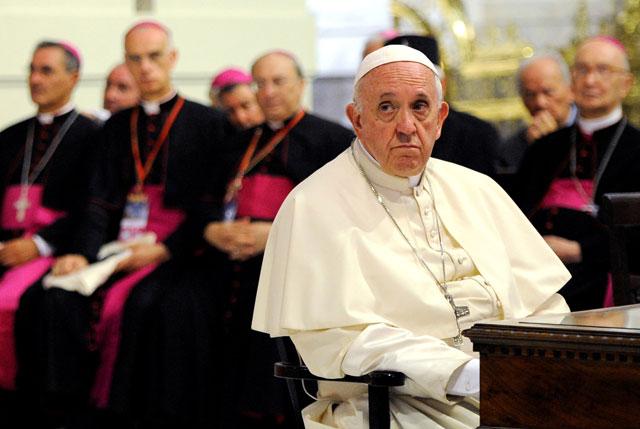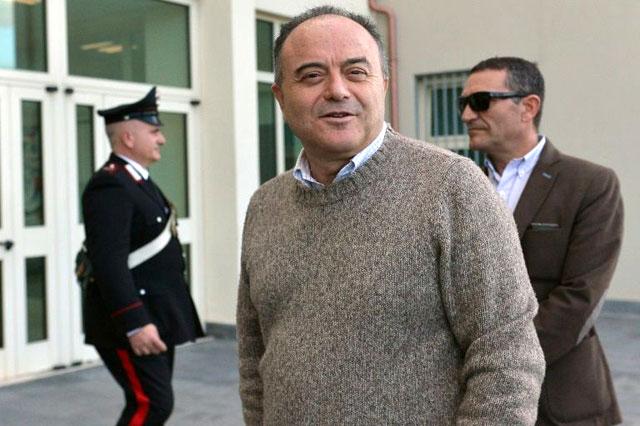You are here
Pope in Sicily to honour ‘martyr’ priest killed by mafia
By AFP - Sep 16,2018 - Last updated at Sep 16,2018

Pope Francis meets with the Sicilian Clergy at the Cathedral of Palermo, Italy, on Saturday (Reuters photo)
PALERMO, Italy — Pope Francis arrived in Sicily on Saturday to pay homage to a priest murdered by the mafia 25 years ago while trying to save youngsters in poor neighbourhoods from falling into their hands.
The brief visit, which will see the 81-year-old pontiff stay on the Italian island until evening, is part of a wider campaign he has been waging against organised crime.
Before arriving in Palermo to hold a mass in honour of Father Giuseppe “Pino” Puglisi, Francis stopped in Piazza Armerina, a small impoverished town in central Sicily.
“The wounds which afflict you are many, and they have a name: Social and cultural under-development, the exploitation of workers and a lack of decent work for young people,” he said to widespread applause.
Although he didn’t mention organised crime, he spoke about “extortionate money-lending” and “gambling”.
The trip will be dedicated to Puglisi, who served as parish priest in the rough Palermo neighbourhood of Brancaccio for two years, trying to engage local youngsters and keep them away from drugs and the mafia suppliers.
But on September 15, 1993 — his 56th birthday — he was shot dead at point-blank range.
“I was waiting for you,” he reportedly said with a smile before dying on the doorstep of his modest home in Brancaccio, a neighbourhood Francis will visit after celebrating mass.
His murder came as Italy was still reeling from the killings of two anti-mafia judges.
In 2012, Pope Benedict XVI officially recognised Puglisi as a martyr, “killed by hatred of the faith”.
The following year he was beatified, in the first step on the path to sainthood within the Roman Catholic Church.
Corruption stinks
Since becoming pope in 2013, Francis has openly confronted the mafia and called on the faithful to stop all collaboration with them.
Mafiosi are often practising members and benefactors of Catholic parishes.
During a 2015 address in Naples, the notorious fiefdom of the country’s oldest organised crime syndicate the Camorra, Francis condemned those “who exploit and corrupt young people, the poor and the disadvantaged”.
“Corruption stinks! And a corrupt society stinks. A Christian who allows corruption to enter is not a Christian. They stink,” he proclaimed in an angry speech.
In Calabria, another Cosa Nostra hotspot in southern Italy, he called on Catholics to combat the local mob, known as the “Ndrangheta”.
“Those who in their lives follow this path of evil, as the mafiosi do, are not in communion with God,” he said, declaring them “ex-communicated” to thunderous applause from the 100,000-strong crowd.
Ex-communication is the severest penalty for Catholics, banishing them from the spiritual life and sacraments of the church.
Local bishops have already ex-communicated mafia members but the Vatican is considering creating a new doctrine ex-communicating organised crime group members worldwide.
Stop doing evil
The Pope has often denounced “money stained with blood, which leads to an evil power” and called on mafiosi to change, urging them: “Convert. Stop doing evil”.
Back in 1993, during a speech in the Sicilian city of Agrigento, Pope John Paul II had also called on mobsters to convert and urged ordinary Sicilians to revolt against the mafia.
The Sicilian Godfathers responded two months later with attacks against two Catholic churches.
Despite the papal rhetoric, relations between the church and organised crime groups have often been ambiguous, with mafia types trying to bribe or influence priests, the misappropriation of resources from institutions and charities, and questions over the purchase of Vatican real estate.
But some local bishops are taking a stand.
Last year, the bishop of Monreale, near Palermo, made headlines by criticising a priest who had allowed the son of one of Sicily’s most notorious mobsters, Toto Riina, to act as godfather at a baptism.
And in 2016, a priest in southern Italy who had wanted to hold a mass in memory of a “Ndrangheta” mafia boss was taken to task by the mayor, the archbishop and his parishioners.
Related Articles
ROME — After years of investigation, mountains of evidence and hundreds of suspects, Italy's plucky anti-mafia prosecutor Nicola Gratteri is
VATICAN CITY — Pope Francis on Tuesday revolutionised the procedure for Roman Catholics to get marriage annulments, making them faster and s
ROME — Italy's finance police on Tuesday busted an international cocaine-smuggling ring run by the 'Ndrangheta crime group after cracking a

















